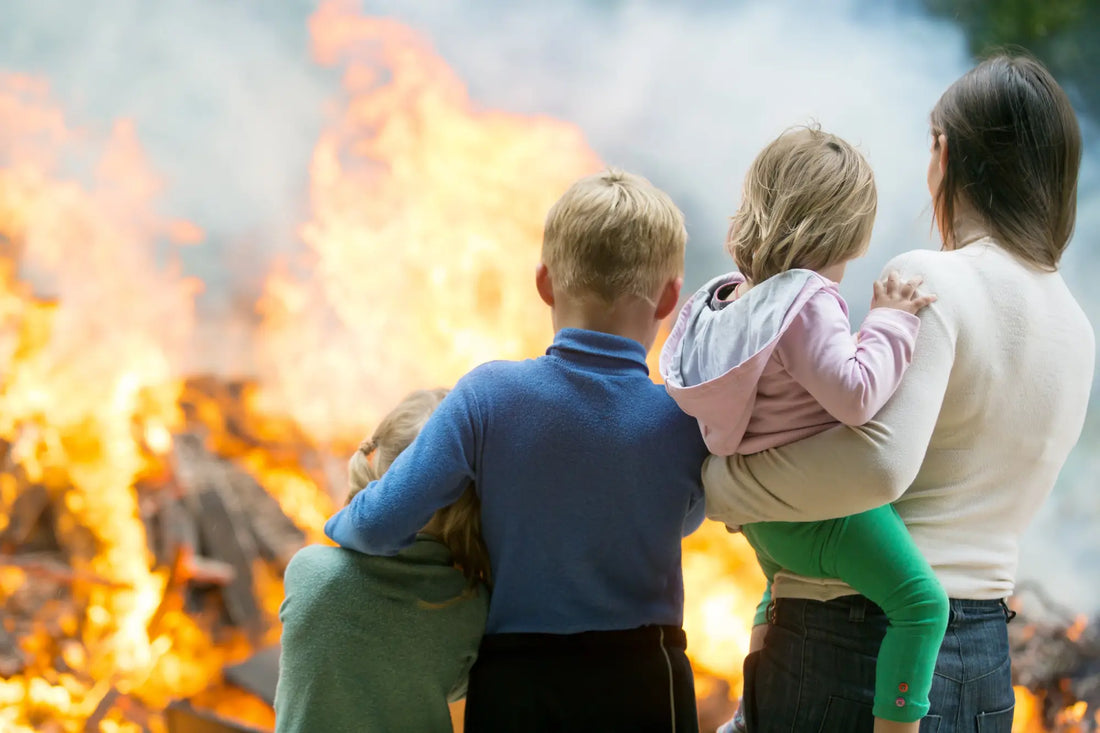
Beginner’s Guide to Disaster Preparedness in the UK
Share
Disaster preparedness is essential for ensuring the safety and well-being of yourself and your family when emergencies strike. While the United Kingdom isn't typically prone to the extreme disasters seen in other parts of the world, it's still important to plan for the unexpected, as the country faces a variety of natural and man-made risks. By being prepared, you can reduce the impact of emergencies on your life. Here's a beginner's guide to help you get started with disaster preparedness.
1. Understanding the Risks in the United Kingdom
Before you can prepare for emergencies, it’s essential to understand the risks that are most likely to affect you in the UK. Some common risks include:
1.1. Flooding
Flooding is a major risk across the UK, particularly in areas near rivers, coasts, or in low-lying regions. Floods can be caused by heavy rainfall, snowmelt, or coastal storm surges.
- Areas at Risk: Coastal and low-lying regions of Scotland, the West Country, the Midlands, Yorkshire, and parts of Wales are especially prone to flooding.
- Preparation: If you live in a flood-prone area, sign up for flood alerts and create an emergency flood kit (more on this below).
1.2. Severe Weather
The UK experiences a variety of severe weather conditions, including high winds, snow, and extreme heatwaves. These can cause disruptions to transport, power outages, property damage, wild fires and risk to health.
- Cold Weather: Winters can bring snow, ice, and freezing temperatures, affecting roads and heating.
- Heatwaves: Summers can experience extreme heat, which can lead to heatstroke and other health concerns. During prolonged periods of dry weather, there can be a risk of wild fires.
1.3. Terrorism
Although the likelihood of you being impacted by a terrorist attack is low, the UK is not immune to acts of terrorism, including bombings, cyberattacks, and mass-casualty events.
- Preparation: Stay informed about potential risks and follow government advice on security. Consider signing up for alerts and being prepared to act in the event of a terrorism-related emergency.
1.4. Pandemics and Health Crises
The COVID-19 pandemic demonstrated how widespread health crises can impact communities. Outbreaks of diseases like flu, norovirus, or other infectious diseases can disrupt daily life.
- Preparation: Stock up on essential medications, face masks, hand sanitisers, and essential hygiene and cleaning supplies. Follow guidance from health authorities, such as the NHS.
1.5. Power Outages
The UK’s power grid is generally reliable, but power outages can still occur due to storms, flooding, or technical failures. Extended blackouts can disrupt heating, food storage, and communication.
1.6. Fire
Fires can happen in the home, in rural areas, or in cities. Wildfires, although not as common in the UK as in other countries, have become more frequent during dry spells.
2. Steps to Prepare for a Disaster
2.1. Create an Emergency Plan
Every family should have an emergency plan that outlines what to do in the event of a disaster. This should include:
- Communication Plan: Have a system in place to contact family members if you're separated. Agree on a meeting point outside your home in case of evacuation.
- Evacuation Routes: Know how to exit your home and the nearest safe routes in case of fire, flooding, or other emergencies.
- Special Needs: Consider any elderly, young children, or pets in your household and make preparations to assist them during an emergency.
2.2. Build an Emergency Kit
An emergency kit is essential for any disaster preparedness plan. This kit should be easy to access and contain everything you may need to survive for at least 72 hours. Some basic items to include are:
- Water: 3 liters per person per day for at least three days.
- Non-perishable food: Canned goods, dried food, or freeze-dried meals.
- First Aid Kit: Bandages, antiseptic, scissors, any necessary medications, and medical supplies.
- Battery-powered or hand-crank radio: To receive emergency updates.
- Flashlights: With extra batteries.
- Mobile phone charger: Preferably a portable power bank.
- Personal hygiene items: Toiletries, hand sanitizers, and wipes.
- Important documents: Copies of identification, insurance details, and medical records.
- Clothing and blankets: For cold weather, include thermal blankets and warm clothing. For warm weather, ensure you have shade in case of extended periods in the heat.
- Cash: Small denominations in case ATMs are down or card payments are unavailable.
2.3. Stay Informed
Sign up for alerts from local authorities to stay informed about potential risks. Useful sources include:
- Flood alerts from the Environment Agency (if you live in a flood-prone area).
- Government alerts on terrorism and public safety.
- Weather services like the UK Met Office for forecasts and weather warnings.
2.4. Home Safety and Security
Taking steps to secure your home can make a big difference in the event of a disaster.
- Flood Preparation: If you live in an area prone to flooding, consider flood barriers or sandbags. Ensure that your drains are clear and that your home is elevated (if possible).
- Fire Safety: Install smoke detectors in every room. Ensure your home is equipped with fire extinguishers and that everyone knows how to use them.
- Electrical Safety: Ensure that your electrical system is up to date and regularly checked by a qualified professional. Know how to turn off gas and electricity in emergencies.
2.5. Prepare for Power Cuts
Power cuts can happen at any time, especially during storms or high winds, but also due to power shortages. Be ready with:
- Back-up lighting: Flashlights, battery-operated lanterns or solar lights.
- Charge your devices: Keep a portable charger handy, and charge essential devices like phones in advance, turn off unessential apps, reduce the brightness and conserve power.
- Cooking options: Have a way to prepare food if your stove or microwave is powered by electricity, such as a camping stove, portable gas burner or if you have one, use your wood burning stove.
3. Additional Tips for Specific Risks
3.1. Flooding
- Keep valuables on higher floors or in waterproof containers.
- Know how to turn off your water supply in case of flooding.
3.2. Severe Weather
- In winter, make sure your central heating works and have extra blankets or sleeping bags and electric heaters on hand. Hot water bottles work well when someone is particularly cold.
- During heatwaves, stay hydrated and avoid excessive outdoor activity and close blinds during the day to prevent the sun heating your home.
- If high winds are predicted, secure outdoor objects that could become projectiles.
3.3. Pandemics
- Keep a supply of face masks, hand sanitisers, and disinfectant wipes.
- Maintain good hygiene practices, such as washing hands frequently and avoiding close contact with others when feeling unwell.
- Be ready to quarantine if necessary, and monitor health advice from the NHS and government officials.
3.4. Terrorism
- Know the location of your nearest emergency exits if in public spaces.
- Learn what to do in the event of a bomb threat, fire, or shooting incident. The “Run, Hide, Tell” method is a good guideline to follow.
4. Maintain Your Preparedness
Preparedness is an ongoing process. Regularly review and update your emergency plans and supplies. For example:
- Check your kit every few months to ensure that food hasn’t expired and that batteries are still working.
- Practice your plan with your family so everyone knows what to do in case of an emergency.
- Stay informed by keeping up with local news, weather alerts, and emergency preparedness tips.
Conclusion
Disaster preparedness is about planning ahead, knowing the risks, and ensuring you and your family are ready for the unexpected. While the UK may not face as many natural disasters as some other regions, there are still several risks, such as flooding, severe weather, and terrorism. By following the steps in this guide—creating an emergency plan, building a kit, staying informed, and taking action—you can be better prepared for whatever challenges may arise. Remember, preparedness can make a critical difference when an emergency strikes.
